 Happy World Water Day! It only makes sense that element that we rely on for life itself should have its very own day. World Water Day was instituted by the United Nations to remind us that much of the world still faces a global water, sanitation and hygiene crisis, and that it is our urgent obligation to act.
Happy World Water Day! It only makes sense that element that we rely on for life itself should have its very own day. World Water Day was instituted by the United Nations to remind us that much of the world still faces a global water, sanitation and hygiene crisis, and that it is our urgent obligation to act.
This year the theme of World Water Day, March 22, is “Water for Food Security.” 1.3 billion tons of food are wasted or thrown away every year. Cutting that amount by 50% would save 1,350 cubic kilometers of water annually. Agriculture uses 85% to 95% of all water in many developing countries. While we can’t stop consuming food and water altogether, there are a few things we can do to conserve water and honor World Water Day this year.
Participate in one of the many worldwide events People across the globe are coming together tomorrow to recognize the importance of water for food security and educate themselves. Check out the UN’s World Water Day website to find an event near you.
Conserve water If you live in an area prone to droughts, you may already live by these tips! Turn off the faucet while you brush your teeth. Adjust your sprinklers so they don’t run in the middle of the day when the sun will simply absorb it. If you have a dishwasher, only run it when the machine is full. If you wash by hand, consider filling one side of the sink to wash in rather than leaving the faucet running. A few simple adjustments can make a world of different on your water footprint!
Conserve food Did you know that most of the water we “drink” is embedded in the food we eat? For example, the production of 1 kilo of beef consumes 15,000 litres of water, while 1 kilo of wheat ’drinks up’ 1,500 litres. Reduce your food waste by paying close attention to the expiration dates on your food, and reducing your meat intake. In the United States, more than 25% of food goes wasted every single year!
Sponsor a water project If you’d like to make a global impact, consider sponsoring a water project. Charity: Water, Water.org, and the UNICEF Tap Project are just a few of the many organizations working to provide water to those without. With more than three times more people lacking water than those living the United States, water projects need our support.
Donate your voice Do you use social media? If you have friends and followers, consider loaning some of your social media updates to raise awareness of World Water Day. Social media is a powerful tool, and you may very well incite your friends to action!
Calculate your water footprint Calculate your water footprint with Water Footprint Network’s Quick Calculator; you may be shocked at what you find! Compare and contrast the water footprints of various countries to gain a better understanding of the shortage.
Get your kids involved If you’d like to get your kids involved, be sure to check out our friend, GenerationOn’s, Project of the Month. The cute animal pictures are just a bonus!
How will you act for World Water Day? Let us know in the comments below.

 Happy Share a Smile Day! Would it make you crack a smile to learn that March 1 is also National Pig Day and Peanut Butter Lover’s Day? There are so many things to smile about; why not take the opportunity to use a few of those smiles for good?
Happy Share a Smile Day! Would it make you crack a smile to learn that March 1 is also National Pig Day and Peanut Butter Lover’s Day? There are so many things to smile about; why not take the opportunity to use a few of those smiles for good? Have you ever found yourself saying, “I’ve always wanted to volunteer, but I don’t have the time,” or “I just don’t know where to start”?
Have you ever found yourself saying, “I’ve always wanted to volunteer, but I don’t have the time,” or “I just don’t know where to start”? • Throw a swap party!
• Throw a swap party!
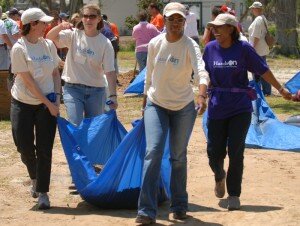
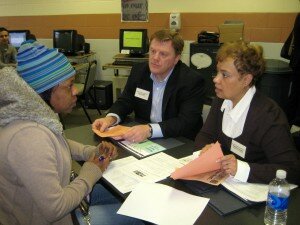
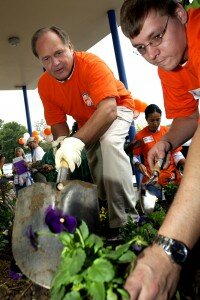

 Today’s post comes from Gared Jones,
Today’s post comes from Gared Jones,  While this Sunday is officially International Volunteer Day and set apart to recognize the impact of volunteers on their communities around the world, each day for me now seems like International Volunteer Day.
While this Sunday is officially International Volunteer Day and set apart to recognize the impact of volunteers on their communities around the world, each day for me now seems like International Volunteer Day. by Jay S. Winuk, Co-founder, Vice President, MyGoodDeed, 9/11 National Day of Service and Remembrance, President, Winuk Communications, Inc.
by Jay S. Winuk, Co-founder, Vice President, MyGoodDeed, 9/11 National Day of Service and Remembrance, President, Winuk Communications, Inc. My life changed forever on that sunny September 11 morning in 2001. My brother Glenn Winuk, a partner at the large law firm Holland & Knight LLP, was murdered by the terrorists who attacked our nation by flying planes into the Twin Towers of the World Trade Center in New York. Situated just a block and a half from the site, Glenn helped evacuate his law offices, then raced toward the South Tower to participate in the rescue effort. He died when that building collapsed. Glenn’s partial remains were recovered about six months later, a borrowed medic bag by his side.
My life changed forever on that sunny September 11 morning in 2001. My brother Glenn Winuk, a partner at the large law firm Holland & Knight LLP, was murdered by the terrorists who attacked our nation by flying planes into the Twin Towers of the World Trade Center in New York. Situated just a block and a half from the site, Glenn helped evacuate his law offices, then raced toward the South Tower to participate in the rescue effort. He died when that building collapsed. Glenn’s partial remains were recovered about six months later, a borrowed medic bag by his side.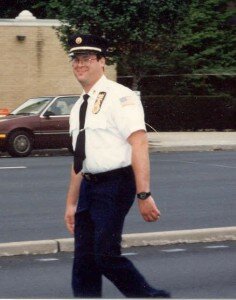 or almost 20 years Glenn was a volunteer firefighter and EMT in our home town of Jericho, NY. He had also served as a fire commissioner and as an officer of Engine Company 2, and was highly decorated. Specially certified in building collapse rescue training, no one was more prepared to race into those towering infernos than my kid brother, dead at 40.
or almost 20 years Glenn was a volunteer firefighter and EMT in our home town of Jericho, NY. He had also served as a fire commissioner and as an officer of Engine Company 2, and was highly decorated. Specially certified in building collapse rescue training, no one was more prepared to race into those towering infernos than my kid brother, dead at 40.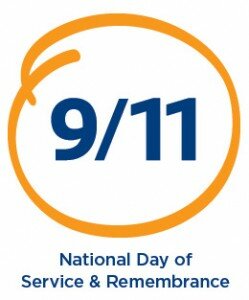 When my friend and colleague David Paine called from California a few months after the attacks to tell me about his idea, it was as if it was scripted. “Let’s work together to make 9/11 a national day of service,” David suggested, so that people will never forget how good people of the world responded when our nation was wounded. And off we were.
When my friend and colleague David Paine called from California a few months after the attacks to tell me about his idea, it was as if it was scripted. “Let’s work together to make 9/11 a national day of service,” David suggested, so that people will never forget how good people of the world responded when our nation was wounded. And off we were.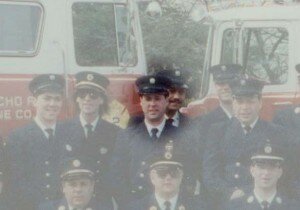 Engaging in service or good deeds on the anniversary each year in honor of those who perished or rose to help is truly an extraordinary phenomenon. Millions of people from all 50 states and countries all over the world now mark September 11 in service to others, with acts small and large. The ways that people participate are countless, creative and meaningful. All who visit our web site at
Engaging in service or good deeds on the anniversary each year in honor of those who perished or rose to help is truly an extraordinary phenomenon. Millions of people from all 50 states and countries all over the world now mark September 11 in service to others, with acts small and large. The ways that people participate are countless, creative and meaningful. All who visit our web site at 
 northern hemisphere. On those days when I am covered in a fine mist of perspiration before 8:00 am and when the evenings are punctuated with the sparkle of fire flies, I find myself recalling a time – long before I became a card-carrying soccer mom and non-profit junkie – when summertime involved the uniquely delightful experience of drinking a very cold beer on a very hot day.
northern hemisphere. On those days when I am covered in a fine mist of perspiration before 8:00 am and when the evenings are punctuated with the sparkle of fire flies, I find myself recalling a time – long before I became a card-carrying soccer mom and non-profit junkie – when summertime involved the uniquely delightful experience of drinking a very cold beer on a very hot day. rent life doesn’t involve much time for beer drinking but does include lots of time supporting an organization that catalyzes folks across the country to volunteer in their communities, I started to ponder why I am even more happy now than I was when I used to drink more beer. Hmmmm….
rent life doesn’t involve much time for beer drinking but does include lots of time supporting an organization that catalyzes folks across the country to volunteer in their communities, I started to ponder why I am even more happy now than I was when I used to drink more beer. Hmmmm….



